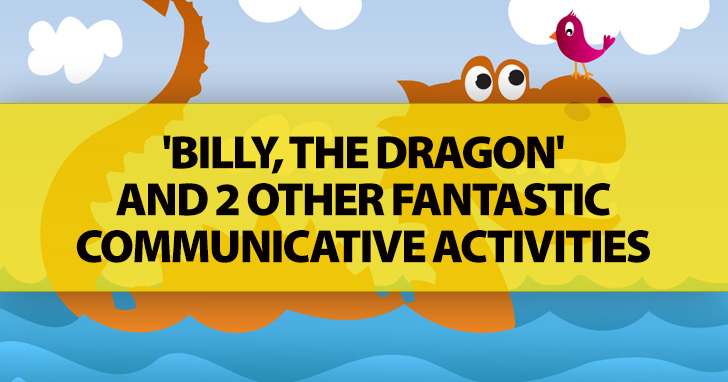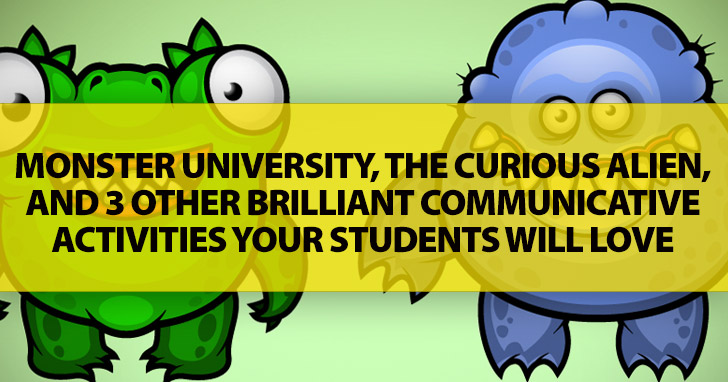'Billy, the Dragon' and 2 Other Fantastic Communicative Activities


Well, there are various reasons for this, such as they aren’t motivated enough, they’re afraid of making mistakes, you as a teacher are scary, they are always corrected, or simply they’re not in the mood of blabbering about certain things they don’t find interesting. The way I see it, most probably one of the most important keys to a successful speaking activity is making it really interesting so it catches students’ attention. Of course, a relaxed learning environment in which students feel comfortable with using English is also essential. In this sense, the number one golden rule would be as follows: “Know your students, do activities which fit their interests whenever you have the chance and stay cool”.

Students work in groups.
Bring some pictures of cartoon monsters to class. Walk around in the class with the pictures in your hand and let students draw one. Explain to them that these monsters are students at the Monster University and you want them to describe the beasts’ looks and personality first. Then, they should think about what their monster’s special ability is, how it behaves, what it studies, what it usually does in its free time, and of course its name. Groups should exchange information by asking questions from each other.
It’s easy to incorporate practicing grammar, let’s say for consolidation, into the activity. Modals, the Present Simple for example are great to practice it with.
In terms of vocabulary, adjectives of looks and personality are revised or introduced. You might want to have students brainstorm some adjectives before starting the activity. A “describe the picture” kind of warm-up is also suggested.
Students work in groups again. Bring some pictures of what you usually find at a junk shop. For example, an old watch, a plastic earring, a painting of someone’s grandma and so on.
Each student in a group chooses a picture and tries to sell the object in the picture to the others as a shop assistant at the junk shop. At this point, you might stress some shopping related vocabulary. The customers shouldn’t let the shop assistant sell the object easily though. They need to ask at least 5 questions about it.
Students should swap roles.
Assign students to small groups. Bring a picture of a cartoonish alien and a set of pictures of everyday objects to class. This one is a role-playing activity.
As a warm-up activity, show the alien to your students and ask them to say the first thing that comes to mind. Brainstorm some words and you might want to have a short discussion about alien beings.
The activity’s background goes like this. While travelling across the galaxy, our alien’s spaceship runs out of energy and has to land to recharge its hyperdrive. It’s an automated process, but takes some hours to be completed. The newcomer decides to leave it behind in a forest while it’s recharging and have a look around. As it’s wandering around in the forest, it meets some of the locals. Fortunately it has got a translator device which enables communication.
In each group, one student is the alien, while the others are locals who accidently discover the ship in the forest. Give the set of pictures of objects to the student who’s the alien.
First, students should have a short conversation asking the alien some questions, for example, what it’s doing here, where it’s from, what’s its name, if it’s friendly and so on.
The alien tells the others that it has seen some objects lying around on the ground in the forest and many strange things through the spaceship’s window while landing and would love to know what those are. The student playing the alien asks others to give definitions of the objects in the pictures. Some example objects would be a plastic bottle/bag, a shoe, a house, some chewing gum, a skyscraper, and so on.
The focus is on communication again, but you might want to teach new words or practice some grammar with this one as well.
Fairyland is in trouble. The kingdom has been suffering from a plague which no one seems to be able to find the cure for. As the situation is quite desperate, the king decides to send messengers to the old wizard who lives in the middle of the forest for help.
First, assign students to small groups. Ask them to discuss some questions related to the activity’s background, for example what a typical wizard’s like, what they think the disease is, what the wizard’s tower is like and so on.
Next, students have to think of a magic potion which cures sick people. They need to think of necessary ingredients for the elixir and the magic words which are required to activate the healing power of the potion. You might consider making a paper pointed hat for students.
In this case, let them speak as much as they want without any serious corrections and interruptions.
This activity is more like a warm-up, but could be done extensively as well. This activity can be frontal and cooperative too.
Prepare some strange conversation starters and give one to a student who should start a conversation with it with another student. The more surprising the starter is the better. Here are some examples.
Excuse me, but what’s your car doing in my pool?
Congratulations! I heard you hit the lottery jackpot!
Wow! It’s your baby? She’s very cute.
Alright, so it seems that you’ve reached the end of this article. There’s nothing left to say but happy teaching!